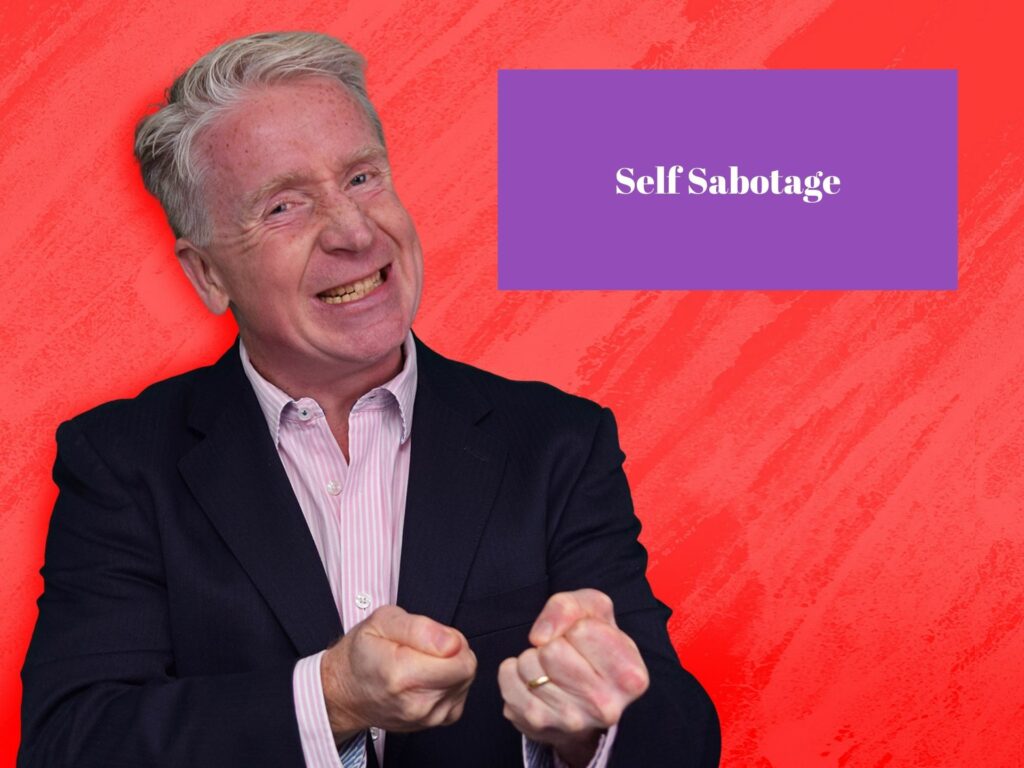
Self-Sabotage
What does self-sabotage mean to you? For most people, our behaviour or thought processes hold us back and prevent us from doing what we want to do. We often know we are doing it, yet continue anyway, and sabotage our performance at work and home life, in our relationships, our sporting progress, or historically in our schoolwork. We need to understand which self-sabotage habits and tactics are natural for us.
Self-sabotage has many different angles depending on how old you are, where you live, what is going on in your life at a particular moment in time. Make a list, on a piece of paper, notepad, on your phone, of the ten things that you do that are the greatest challenges to you performing at your best most of the time more of the time. When I’ve asked people to do this before, the majority have their mobile phone in the top three; let’s be fair for most people, it’s number one!
These are the things we do that distract or take us away from what we need to do. Whether that be watching videos of puppies and kittens or random science films on something entirely irrelevant to the task at hand or just catching up on the latest headlines in the news or our sporting teams.
Add to that the potentially harmful effects of the social media rabbit hole: endlessly scrolling and looking to see what a friend of a friend of a friend that you used to go to school with years ago is now doing, what they look like and who their friends are. Are they still as beautiful as you remember? Have they changed, put on or lost weight? Are they married or single? Do these questions have any bearing on what you are working on right now? Welcome to the rabbit hole of social media, one of our most significant self-sabotage practices.
When I eat a balanced diet, my brain fires more effectively, and I’m more likely to perform well in my working day. By contrast, if I’ve been up late, out eating and drinking and excessively enjoying myself, my brain just doesn’t fire as fast or effectively as I would like it to, which can cost me time, productivity and indirectly, money.
What are other self-sabotage tactics for you? What do you allow to take over and distract you from the task at hand? When people are involved with their favourite hobbies, they can get lost for hours. It’s a good thing to get lost in a hobby, but not to the detriment of your performance at work or whatever other goals you are trying to achieve. Habitual distractions, such as watching random box sets that go on and on, before you know it, eight hours have disappeared. You haven’t left the sofa in any shape or form apart from going to the loo or getting more coffee.
Recognising how you self-sabotage is the important first step. Only then can you do something about it. What are the top 10 for you? Don’t look for the “correct answers” or be embarrassed about your answers. Be honest. Do not share your list with anybody else; that will allow you to be more insightful and honest.
Step two is investigating what can you do to prevent them. What small changes can be made to alter your state of mind or physical situation so that you’re able to keep on with what needs doing now?
I’ve witnessed too many people spending hours working on their computers late at night because they think they are too busy. Sadly, they have not been as effective as they could have been earlier in the day, costing them valuable personal and family life, which is so precious to us all.
Can you make these changes yourself, or do you need help from others? If you need help, ask for it. Build a support team that is right for you for the way ahead. Allow these people to be honest with you when you’re self-sabotaging yourself.
Remember, the aim is never perfection, and perfection doesn’t exist. The target is to enable you to perform at your best most of the time, not all of the time.
Good luck!

